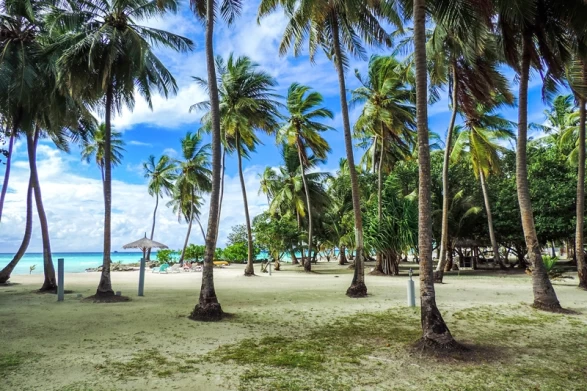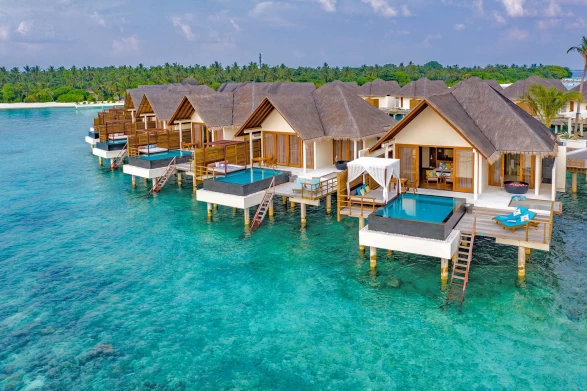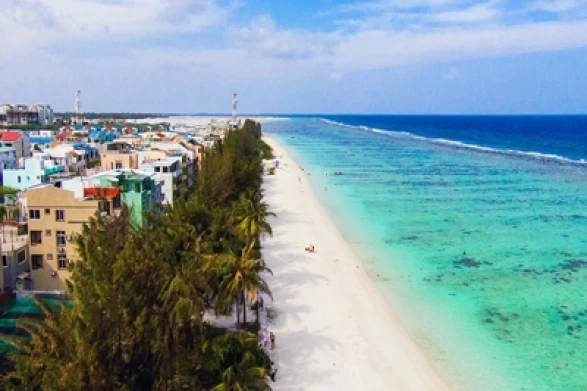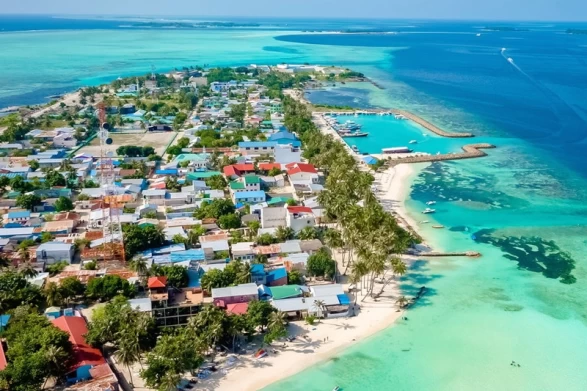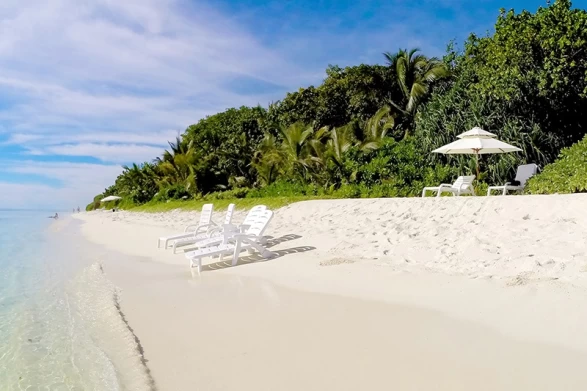Ari Atoll
Alif Alif or Alufu Atoll (Ari) is an administrative division of the Maldives. It was created on March 1, 1984 combining northern section of Ari Atoll, the small Rasdhukuramathi Atoll, and the isolated island of Thoddoo. Many of the islands in this atoll have been inhabited since ancient times and have archaeological remains from the Maldivian Buddhist period. It is one of the biggest atolls and is located in the west of the archipelago. The almost rectangular alignment spreads the islands over an area of about 89x30 kilometers. It has been divided in two sections for administrative purposes, Northern Ari Atoll and Southern Ari Atoll consisting of 105 islands. Ari Atoll is part of the zone designated for tourist development in the Maldives. It is roughly a 30-minute seaplane flight or 90-minute speedboat ride away from the Capital Male'.
Diving
Diving Maldives - Ari Atoll
Ari atoll provides a full range of underwater adventure. There are dive sites scattered all around the atoll. Many divers consider the sites to be the finest in the Maldives. You will encounter manta rays, sharks and other pelagic fish and even mighty whale sharks around Ari Atoll. The most consistent sites are located here although there are also spots elsewhere for sharks and mantas. Top tourist activity in Ari Atoll is scuba diving and its the best place to visit if you love to scuba dive. Diving in the Maldives means seeing dense populations of fish, caverns festooned with colours, exploring caves, diving over pristine coral landscapes and investigating wrecks teeming with marine life. Some of the most famous dive sites in Maldives like Maaya thila, are located very close to our island - Ukulhas.
Visiting & Tourism
Visit Ukulhas Island
Ukulhas is a fishing village nestle in the Indian Ocean. The island is surrounded by pristine turquoise water and white sandy beaches. The island is uniquely featured and is well known for its environment friendliness activities. It's the first ever systematically waste managed Island in the Maldives. For providing outstanding services to protect and preserve the environment Ukulhas achieved the "Green Leaf Award" in the year 2014. Ukulhas conducts several cleaning and planting programs each year.
Nearly every inhabitant knows more than one profession. A fisherman may not only know fishing, but also carpentry or masonry works. Fishing is the dominant occupation of this close-knit community, and the island is famed for its yellowfin tuna boats. The language spoken is Dhivehi, however most people know and speak English language well. The people of the island are family oriented. As the Maldives is in the middle of Indian Ocean, the route has long been a meeting place for African, Arab, Malay and Indonesian mariners. This exchange has led to a very diverse culture; composed of many different ethnic groups.
Historical Sites & Speciality
Waste management in Ukulhas
Ukulhas is well regarded as an environment friendly Island where the waste is managed in a systematic manner. As a result of its outstanding services to protect and preserve the vulnerable environment, Ukulhas achieved the "Green Leaf Award" by the Maldivian government in the year 2014. Ukulhas implements huge cleaning programs, planting programs, several programs on waste management and programs on marine and biodiversity. Hence today Ukulhas is exemplary island on dealing with mega environmental issues which results Ukulhas is marked as environmentally role model Island in its archipelago.
Today Ukulhas islanders do not require going out for dump their garbage; Island council manages island wastes in a systematic manner. For outside trash management, dustbins are kept in an adequate distance everywhere in the island. People in the island may not require throw their litters such as cans, bottle, papers etc. Therefore the island and its beaches are kept clean and tidy. In Ukulhas, households manage their wastes by segregation, such as recyclable items (e.g.; aluminum, copper, steel, plastics, papers etc.), organic items (e.g.; food items), and plant materials (e.g.; leaves, stems etc.). After the segregation the wastes are kept in the houses. Except Friday, each day council pick-up visits houses to collect segregated wastes for disposing and managing; Fees are collected by the council for the waste management.
Three major methods are used in Ukulhas for the disposal; such as recycling, pyrolysis and Composting. Aluminum items such as beverage cans, copper such as wires, steel and aerosol cans, old steel furnishings or equipment, polyethylene and PET bottles, Glass bottles and jars etc. are separated. Recyclable items are sold once or twice a month. For the pyrolysis, plant items, wooden materials, card boards, magazines, light paper etc. are placed on a decomposition chamber which is burned into charcoal and ash. For the composting, organic matters are decomposed and recycled as a fertilizer. It's a key ingredient for organic farming. For decompose organic matters such as leaves, "green" food wastes are wetted make a heap and keep those heaps for a week or months to break down into "humus". After the breaking down into humus, composed fertilizers are packed and labelled for the sale.
Our collection of destinations
Take a look at other dive sites we offer below.
Scuba diving can also be combined with accommodation in any of our destinations or our excursion trips or our holiday packages.
Contact us for a personalized package including daily dives or diving courses.
CONTACT US : Ukulhas
Ukulhas
Ukulhas
- H. Sunaaru, Guleynooran Magu, Male', 20079, Maldives
- +960 7785165
- info@diveclubmaldives.com
-
Follow:

